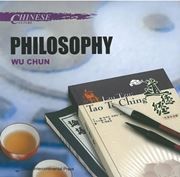Philosophy - Chinese Culture
哲学思想 - 中国文化
Publisher:
China Intercontinental Press
Publication:
1/2015
Languages:
English
Binding:
Paperback
ISBN/SKU:
9787508527451
Pages:
224
Sizes:
208 x 208mm
Weight:
0.4810
In Stock (Only 1 copy left)
To be dispatched within 1 business day
To be dispatched within 1 business day
Special Price
£37.56
£37.56
Regular Price
£39.95
(€42.07)
Chinese Culture: Philosophic Thinking introduces Chinese philosophy from five topics, namely what is the nature of the world; what is the relationship between things; what is the law of society; what is the orientation of life; what is the structure of understanding, attempting to help readers to grasp the basic features of Chinese philosophy by reading this book.
Preface
WHAT IS THE NATURE OF THE WORLD?
The Birth of Beliefs
Shen, the Religious Source of Chinese Philosophical Ideas
Atheism
The Formation of Concepts about Nature
Yin and Yang and the Five Elements: the Intellectual Source of Chinese Philosophical Ideas
Vestiges of Magic
Observation and Thinking about Phenomena
The Concept of Difference or Diversity
The Concept of Change or Changeability
Sameness and Difference, Constancy and Change
The Quest for Essence and Laws
Dao
Li
Qi
WHAT ARE THE RELATIONSHIPS BETWEEN THINGS?
The Relationship Between Heaven and the Human, and its Religious and Intellectual Background
The Religious Approach to the Heaven- Human Relationship
The Intellectual Approach to the Heaven- human Relationship
The Dialectical Outlook
Opposition
Mutual Reliance
Transformation
Relativity
The Holistic Outlook
The Golden Mean
Consideration of Both Sides
Synthesis
Association
WHAT ARE SOCIAL NORMS?
Moral Consciousness and the Establishment of Confucian Moral Principles
The Zhou Dynasty: the Origin of the Sense of Morality
Confucius: the Tradition of Rites and the Spirit of Benevolence
The Development of Confucian Social Norms
Mencius’ Idea of Benevolent Rule and Xun Zi’s Idea of “Propriety and Law”
Edification and the Ethical Tradition of Chinese Civilization
The Confucian View on “Righteousness vs. Profit” and “Heavenly Principle vs. Human Desire”
Reflections on Social Issues in Other Schools of Thought
The Taoist Idea of Non-action
The Legalist Idea of Rule by Law
Views on History
Various Views on History
The Circulatory Theory of History
WHAT IS THE PROPER ORIENTATION OF LIFE?
The Ideal Confucian Character and its Cultivation
The Ideal Confucian Character Established by Confucius
The Cultivation of the Ideal Character
Music and Character Building
Completion through Music
Equilibrium and Harmony
The Confucian Theory of Human Nature
Mencius’ Doctrine of the Goodness of Human Nature
Xun Zi’s Doctrine of the Evil of Human Nature
The Development of Theories on Human Nature
The Taoist Outlook on Life
Lao Tzu’s Outlook on Life
Chuang Tzu’s Outlook on Life
WHAT IS THE STRUCTURE OF KNOWLEDGE?
The Source and Ability of Knowledge
Knowing and Not Knowing
Mind and Object
Name and Substance
Language and Meaning
The Structure or Form of Knowledge
Information and Thinking
Gradual Study and Epiphany
Investigating Things and Gaining Knowledge
Removing Obstructions
Receptiveness and Serenity
Views on Knowledge and Action
The Foundation of Early Views on Knowledge and Action
Word and Action, Knowledge and Practice
Zhu Xi’s View on Knowledge and Action
Wang Yangming’s View on Knowledge and Action
Wang Fuzhi’s View on Knowledge and Action
Appendix




